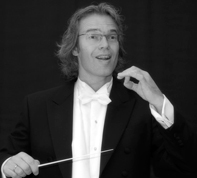|
|
2016 World Projects Composition Contest CALL FOR ENTRIES! Entries for the 3rd Annual World Projects Composition Contest are due December 1st, 2016!! The winner will be announced at the 2016 Midwest Clinic in Chicago! Mark your calendar!
COMPOSERS' CORNER with Brett Abigaña VOL. VIII October, 2016
An Interview with Carl Wittrock This month, I was privileged to sit down with Dutch composer Carl Wittrock, who will be the Composer-in-Residence at the 2017 New York International Music Festival at Carnegie Hall.
BA - How do you think European music has changed or developed over the last 20 years, and do you like its current trajectory? CW - Well first of all, in Europe, we have many orchestras. In every town there is a wind band, and there’s a lot of composing for those bands. But the music that is being composed is lighter, more entertainment music, or film music. It’s music so the band can have one rehearsal then a nice concert, and the audience has a nice evening. Of course there are orchestras who play the new music of, as we say in Holland, “the real composers,” too. But there are two ways of music in Holland right now, and in some ways they are coming together. It’s very important that everyone can play an instrument in Holland, and in Europe; it’s easy to get an instrument, and it’s easy to get started. And the music you play isn’t 12-tone or difficult to understand, and I think that’s a very natural thing. Then when they get better, you can play in orchestras that do more interesting things. So you have both of those directions going on, and I think both are important. BA - That’s interesting, because we’re seeing a similar dichotomy here, in that much of the music written for educational ensembles has become quite formulaic, even predictable. Of course some composers and conductors are pushing back against that and trying to show non-professional musicians that music doesn’t have to be in Eb Major, and that it doesn’t have to follow an ABA form. It sounds like there’s a similar situation going on in Europe where you’re trying to maintain a balance between these two streams. CW - Yes, absolutely. And another thing that’s happening here is that our orchestras play all of the old music, year after year, and there’s almost no new composing. They just concentrate on the old masters. Most of the new compositions are for wind band in Europe, and there’s a lot of new music coming out every year, but like in the USA, it’s often what’s nice and what’s playable. The orchestral world is very old fashioned, but of course they also get most of the money. BA - What do you wish conductors knew about living composers that perhaps they don’t? CW - That’s an interesting question. I think most conductors, myself included, tend to play the same pieces. They listen to recordings and concerts, then play the same pieces. They don’t want to sit at the piano with a score and learn a new piece. But I think it’s always interesting to learn new music, and I think they should do more of that. BA - What about teachers? What should they know about composers that perhaps they don’t? CW - They have to know that it’s possible to play new music with children. It doesn’t need to be difficult every time. Especially when they’re younger, they can play anything, and it doesn’t make a difference if it’s film music or 12-tone. In fact, they love 12-tone music. I’m a teacher at a high school myself, and 12-tone is easy for them to understand, and they like it. So teachers shouldn’t be afraid of new music. BA - I absolutely agree! If these kids don’t go to a conservatory, where else are they going to hear or play this music if not from their high school music program? CW - Yeah, and it’s the same here. We seem to have a fear of this new music, but the kids love it! BA - What advice would you give to a young composer who perhaps just left school and wants to embark on their career but is having trouble getting their music heard? CW - There are two ways. Sometimes you have to follow the money. But you also have to be true to yourself. If you feel strongly about something, you should write it, and if it’s good enough, it will be played. If it’s not, well then it won’t be played. I think it’s very simple. If you walk in front of everyone, then maybe y you’ll only be played when you’re dead, and that’s your own choice. Some young composers have a mission, and they shouldn’t be afraid of doing that. But if you want money, you may have to write a little more in the mainstream. It’s always easier when you don’t have to think about anything and you can just write, but then sometimes only professionals can play it. For me, it’s always interesting to combine the two approaches so I can write good music that students can still play. But the job of a composer has changed in the last few centuries. Mozart sometimes would write music just for the money, too. But now composers are supposed to have a grand mission when they write, and I don’t think it has to be that way. BA - Along with that then, do you think composers would be better off if we returned things to that 18th century craftsman model? CW - Well of course it’s important to work on craft. You can write music and know nothing, but it’s better if you know something, if you can write fugues and piano sonatas. You can always tell when you listen to a piece if it’s a composer who knows his skills or if he’s just lucky. BA - Throughout your career, can you point to one specific collaboration that you particularly enjoyed? CW - For me, it was a piece I wrote for clarinet and bass clarinet. It was written for two wonderful players, and it was a very close collaboration. I could write a little, they could play it, then I can go write it again based on that. It was a very nice process for me. BA - A lot of composers can have very mixed feelings about that collaborative process. Do you prefer to have a longer collaboration? CW - Yes, I prefer that when it’s possible, but sometime you just have to write the piece and drop it in their hands. I’d rather have a lot of information. It’s also possible to get information back, so if they don’t like a passage they can give it back and you can rewrite it. I’m not one of those who thinks “this is final, in stone.” BA - My final question for you is another of those that many composers hate, but I have to ask you. Do you have a favorite piece of yours? CW - Yes, for me it’s a piece called The Legend of Flathead Lake. That’s a piece I wrote for myself, so it wasn’t commissioned. But I’m very satisfied with the result. But other pieces are very suitable for their occasions. Like one of my pieces was written for the anniversary of the Kingdom of the Netherlands and has to be played by every orchestra in the country, so it can’t be too difficult. But I’m very satisfied with the result; not musically, because it’s really nothing special, but practically, it was very difficult to write since it had to be suitable for wind band, fanfare band, brass band, and every other ensemble. But musically, The Legend of Flathead Lake is one of my favorite pieces.
|




